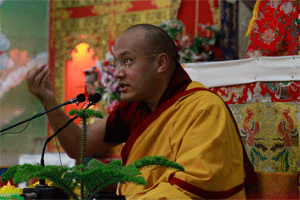26th Feb –Vajra Vidhya Institute, Sarnath.
As the Spring Teachings entered their fifth day, the Gyalwang Karmapa began to explore the role of devotion in our practice. Teaching from a new instruction within the ‘Tri Thung Gyatsa’ text, he began by explaining that devotion is critical for our dharma practice, particularly within the Kagyu tradition. And yet, it isn’t all that easy to correctly develop devotion.
First we need to understand what devotion means. Drawing a clear distinction between faith and devotion, the Gyalwang Karmapa said, “When we think about faith, then faith is like a feeling we have in our minds. But devotion isn’t just a feeling. It’s not just an emotion. It’s something that we put into practice with our body and speech.”
To illustrate his point, the Gyalwang Karmapa then explained the meaning inherent within the Tibetan term for devotion, mo-gü. The first syllable of the word means to have great longing, he explained, while the second syllable means actually doing things with our body and speech. Only by bringing these two elements together can we fully understand the active nature of devotion, which is more than a mere emotion or feeling. Rather, devotion means an act that we do with all three spheres of our being – our body, speech, and mind.
The Gyalwang Karmapa then touched on the vital role played by the qualified teacher. When correct understanding from the side of the student meets with great compassion from the side of the teacher, we must open the door of our devotion in order to receive their blessings.
“The student needs to have faith and longing, and if this faith and longing come together then I don’t think that sort of a student will have any difficulty finding a genuine, authentic Lama. The reason is that all the Buddhas and Bodhisattvas are ready at all six times of day and night to do things to benefit sentient beings. They’re all ready and waiting. If you have both faith and longing then they’ll all come rushing towards you to help you. You just have to open that door of faith and devotion.”
During the session the Gyalwang Karmapa also returned once more to a core theme which he has emphasized throughout the Spring Teachings – how to practice the dharma with our whole being.
“When we say practice, it’s not all that helpful for us just to hear the dharma, or listen to the dharma. It’s not all that helpful for us to develop some kind of understanding about the dharma. What we really need to do is join the dharma with our own being, and then we need to practice that over and over again. Joining our being with the dharma, so that we can become habituated and familiarized with it – this is what is most important.”



